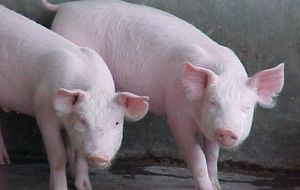MercoPress. South Atlantic News Agency
OIE strongly counsels against the culling of pigs

The OIE (Epizooties International Organization) strongly counsels against the culling of pigs in the current situation with A/H1N1 influenza that started in North America, reports the organization from Paris.
Scientific information currently available to the OIE and partner organisations indicates that this novel A/H1N1 influenza virus is being transmitted amongst humans; there is no evidence of infection in pigs, or of humans acquiring infection directly from pigs.
Moreover, and despite the fact that the currently circulating A/H1N1 influenza virus is not simply a swine influenza virus (it has reassortant genetic material of human, avian and swine origin), it is important to note that swine influenza has not been shown to be transmissible to people through eating pig meat or other products derived from pigs.
The OIE advises Members that the culling of pigs will not help to guard against public or animal health risks presented by this novel A/H1N1 influenza virus and such action is inappropriate. Instead, Members should focus their efforts on appropriate disease surveillance and strengthening the general biosecurity measures applied at premises where pigs are handled and slaughtered.
The OIE is collaborating with its network of reference laboratories and collaborating centres, as well as with the World Health Organization and the UN Food and Agriculture Organization in scientific investigations on the current situation and will if needed issue further advice regarding biosecurity and trade measures in due course. Thanks to these current investigations, the patho-genicity (if any) of the circulating virus for animals should be known shortly and, once known, will be the subject of a further communication from the OIE.
In the meantime, Veterinary Authorities should work in collaboration with human health counterparts to monitor pig herds for any signs of unusual illness with suspected linkages to human cases of A/H1N1 influenza, concludes the OIE release.
The World Health Organization also released a short statement on concerns about the possibility of the A/H1N1 virus being found in pigs and the safety of pork and pork products has been raised.
Who stated that influenza viruses are not known to be transmissible to people through eating processed pork or other food products derived from pigs. Heat treatments commonly used in cooking meat (e.g. 70°C/160°F core temperature) will readily inactivate any viruses potentially present in raw meat products.
Pork and pork products, handled in accordance with good hygienic practices recommended by the WHO, Codex Alimentarius Commission and the OIE, will not be a source of infection
However authorities and consumers should ensure that meat from sick pigs or pigs found dead are not processed or used for human consumption under any circumstances.




Top Comments
Disclaimer & comment rulesCommenting for this story is now closed.
If you have a Facebook account, become a fan and comment on our Facebook Page!